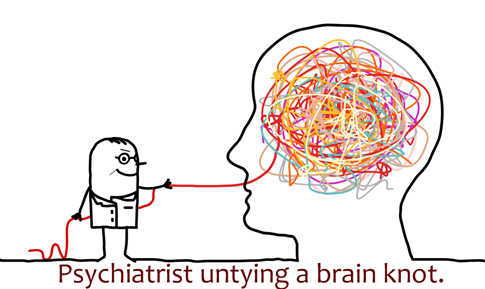Why the "Correct their stinking thinking" model doesn't always help.
 Monday, February 25, 2013 at 10:36AM
Monday, February 25, 2013 at 10:36AM 
Most Christians have been given the Corrective Thinking Model of helping: "This friend isn't able to heal because they've got 'stinking thinking' that's preventing it. They're not able to receive the healing because they are holding stubbornly to misguided, destructive, even faithless thoughts."
While on the one hand, this may be true in some cases, it often isn't helpful to tell the person that they're believing and thinking wrongly, and it may not reveal the true problem. I've discovered when using the Corrective Thinking Model that it only proves mildly helpful because it often can't bring about the recovery needed: Besides the person may already be well-aware of their destructive thought patterns, yet feel helpless to overcome them.
The Corrective Thinking Model [Just Fix What's Wrong With Their Bad Thinking] is rooted in an Analysis Model that assumes: "If we can diagnose the why, then we've healed the what." This model assumes that analysis equals healing. It does not: Just like determining why you broke your leg during a skiing accident doesn't, in and of itself, heal the bones. Answering the "why" only gives you revelation not restoration.
Agnes Sanford, in her classic on prayer, The Healing Light, describes the hazards of the "Correct their bad thinking" model:
"You mustn't think that way!" cries the would-be helper. "You'll never get well when you think that way! My dear, let me tell you ..." And [the helper] proceeds to hold forth upon her own line, to hand over her own ready-made cure-all. ...
Sometimes it happens to fit the need of the sufferer, and sometimes it does not. And the one who longs to help mourns that the patient has no spiritual understanding.
Sanford offers this counsel to would-be friends and helpers:
The sick mind does not respond to reason.
[Notice what Sanford indicates: In our frustration as helpers, we often blame the patient for a lack of spiritual understanding, rather than questioning the approach used.]
A better model:
We often jump in with the Corrective Thinking Model because we sincerely want to help, and it's the only model we've been given. A more helpful question than, "How do I correct this person's poor thinking and bad beliefs about themselves or God," might be,
"Jesus, you got here before I did. What are you up to? Before I got here, you were already initiating my friend's restoration. Help me understand what you're doing as you love my friend. How can I join you?"
There's no shame in this: We're simply being invited to learn from Jesus, who is a gracious teacher.
Recommended resources:
- The Healing Light, by Agnes Sanford
- The Four Streams, audio series by John EldredgeN
Note: This is an issue I've addressed in the past in other places, especially in a two-part podcast with author Dwight Edwards ["Revolution Within"]:
- Podcast: "Revolution Within," Part One
- Podcast: "Revolution Within," Part Two



















